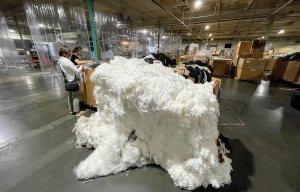
Backing for North Carolina textile upcycling
One of the single largest investment programmes in place-specific R&D in US history.

30th January 2024
Innovation in Textiles
|
North Carolina, USA
North Carolina’s textile industry is to receive funding of up to $160 million over the next ten years from the US National Science Foundation (NSF), to drive innovation, with a focus on developing new routes to recycling waste materials into new fibres.
The North Carolina Textile Innovation and Sustainability Engine is one of ten to be established by the Biden government with NSF investment of nearly $1.6 billion over the next decade – representing one of the single largest investments in place-based research and development in the nation’s history.
“The inaugural NSF Engine awards demonstrate our enduring commitment to creating opportunity everywhere and enabling innovation anywhere,” said NSF director Sethuraman Panchanathan. “Through these NSF Engines, we aim to expand the frontiers of technology and innovation and spur economic growth across the nation through unprecedented investments in people and partnerships. NSF Engines hold significant promise to elevate and transform entire geographic regions into world-leading hubs of innovation.”
The North Carolina NSF Engine’s region of service encompasses the textile supply chain covering central and western North Carolina and stretches into the Appalachian regions of upstate South Carolina, eastern Tennessee and southern Virginia.
The region boasts the largest concentration of textile workers in the USA with more than 27,000 and an additional 30,000 employees in adjacent industries, spanning almost 2,000 companies.
Industrial Commons
The initiative will be led by The Industrial Commons (TIC), a non-profit organisation with a strong reputation within the textile sector for being a hub of regional, rural innovation, with deep local and sectoral knowledge and relationships.
Founded in 2015, TIC’s mission is to rebuild a diverse working class based on locally rooted wealth by founding and scaling employee-owned social enterprises, creating industry networks and delivering a suite of workforce development and youth engagement programmes.
“Although this industry has seen its fair share of challenges, we see so much potential for it to drive economic change in our region,” said TIC co-executive director Molly Hemstreet. “This award will allow us to build on our legacy industries and depth of innovation to create opportunity for workers and our communities. We are indebted to our amazing partners who made this possible and we look forward to scaling our impact and strengthening our industry.”
NC State
A core partner will be North Carolina State University, with its Zeis Textiles Extension unit, the Textile Protection and Comfort Center, and Wilson College of Textiles research labs providing development, fabrication, testing and training services to the region to help “green” the textile industry. The aim is to capitalise on the circular economy, or the process by which waste becomes a raw material input, extending the life cycle of products through improved design and durability, and ensuring systems that facilitate their reuse.
“Thanks to our traditional strengths in technology transfer, NC State is well positioned to lead the Engine’s innovations in research and development,” said NC State chancellor Randy Woodson. “The Engine also includes partnerships across community colleges, manufacturers, brands, economic development and state government. The team will have the infrastructure and ties to rapidly develop, revitalize and scale a cutting edge and environmentally sustainable textile industry that can be competitive in the global economy.”
According to Andre West, director of NC State’s Zeis Textiles Extension, potential key outcomes of the Engine include a decrease in the negative environmental effects of the textile sector, including a reduction in the sector’s carbon footprint, the increased US production of textile products, a growth in the number of textile jobs, a reduction in the amount of textiles put into the landfill and the development of new product lines that use circular materials.
“The Engine will look for ways to capture and process post-consumer waste at scale, and then process that waste into the building blocks that can become fibres for new textiles,” he said. “It will also take a broad approach that focuses on all aspects of the sustainability ecosystem.”
This includes an emphasis on increasing product durability, expanding repair capabilities to keep products in use and developing better systems and processes for textile reclamation. The Engine will also focus on increased reuse of materials including additional material from the landfill and towards recycling options such as the production of nonwovens. It will also research and advance additive chemistries, and new materials.
Forward looking textile applications will also be a focus, including new fibre-based materials used in wind turbine blades, the health monitoring of roadways, bridges and structural components, and nanofibres used in battery components.

Business intelligence for the fibre, textiles and apparel industries: technologies, innovations, markets, investments, trade policy, sourcing, strategy...
Find out more